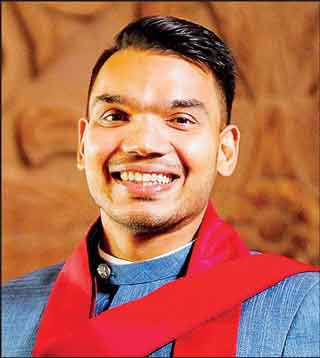Wednesday Feb 18, 2026
Wednesday Feb 18, 2026
Friday, 8 October 2021 00:00 - - {{hitsCtrl.values.hits}}
 |
| Minister Namal Rajapaksa
|
The Government this week agreed upon a slew of decisive steps to accelerate Sri Lanka’s digital take-off in a bid to create new growth opportunities and improve efficiency, competitiveness and transparency.
On a proposal made by Minister Namal Rajapaksa, the Cabinet of Ministers on Tuesday approved the appointment of committee comprising Government and private sector individuals to advise the Cabinet on the possible regulations, acts and laws in cryptocurrency mining, digital-driven banking, adoption of cryptocurrencies and blockchain technologies.
This committee will be mandated to study the regulations and initiatives of other countries such as Dubai, Malaysia, Philippines, EU, and Singapore, etc., and propose a suitable framework to be implemented in Sri Lanka. The committee will also study the laws and regulations of other countries in terms of anti-money laundering, terrorism financing, criminal activities, and the Know Your Customer (KYC) processes.
Rajapaksa made the proposal as the Minister of Development Coordination and Monitoring and State Minister of Digital Technology and Enterprise Development. He is also Sports and Youth Minister.
He told the Daily FT it was proposed to Cabinet to offer companies and entrepreneurs and startups engaged in digital banking and cryptocurrency, blockchain technologies and crypto mining to be allowed to set up offices in Sri Lanka and establish an operating base.
“This would also include having a special scheme of visas for such companies and entrepreneurs, as their spending power and capacity will assist in GDP growth and indirect tax in terms of revenue into the country,” he added.
He also proposed to set up a Blockchain Academy on a PPP basis to support youth in skilling themselves in the blockchain space while enabling them to find employment opportunities from foreign companies. “I firmly believe that such opportunities will directly enable the youth to bring foreign revenue into the country and retain talent within the country,” Rajapaksa emphasised.
Another recommendation is the establishment of the Sri Lanka Blockchain Centre under the purview of the State Ministry of Digital Technology and Enterprise Development to facilitate Foreign Direct Investment (FDIs) with the facilitation of the Board of Investment (BOI) and the Information and Communication Technology Agency (ICTA).
A Blockchain Summit in Sri Lanka with the participation of local and foreign private sector companies is also planned.
It also aimed to device a mechanism for interested blockchain companies consuming power to deploy captive renewable power plants with a storage of 10 feed power during peak times to reduce the burden on the grid under the purview of the Ministry of Power and State Ministry of Solar Power, Wind and Hydro Power Generation Projects Development and the Ceylon Electricity Board (CEB).
“My Ministry will continue to be advised by the committee which will begin drafting the policies from this week and we hope to complete this task just ahead of the November Budget,” said Rajapaksa, adding, “Sri Lanka has many opportunities available and it is time we take action to keep up with global trends as the new generation of youngsters prepares to enter the workforce.”
Explaining the rationale for his proposal, he said as the world now aimed to return to normalcy from the global COVID-19 pandemic, several countries were back to work, this time with the responsibility of creating more employment and development opportunities.
“This comes with great challenges and innovation around digital technologies which will play a key role in the ‘new normal,’” he said, adding, “Sri Lanka is just recovering from a third wave of COVID and the pandemic affected millions of our citizens in numerous ways. Some lost their jobs, while many others are looking at fresh avenues to start over.”
While Asia is still catching up to many of the ‘newer’ technologies, most of the developed countries have implemented much relaxed policies and legislation around cryptocurrencies and blockchain-related technologies, enabling smoother, faster and transparent processes and procedures.
“As we now edge closer to 2022, it is now time for Sri Lanka to keep up with the global trends which not only will create better opportunities for the youth in the global markets but will also enable us as a Government to create more digital-centric opportunities here at home and strengthen the economy,” emphasised Rajapaksa.
He said that new initiatives were also in line with the National Policy Framework – Vistas of Prosperity and Splendour of President Gotabaya Rajapaksa which highlighted the importance and values of a technology-based society.
“I seek cooperation from all stakeholders, whether it be private citizens, startups, corporates, and Government agencies, to support the initiatives to take Sri Lanka digital. I firmly believe that blockchain technologies and crypto currencies will create a more transparent society and enable the country to integrate itself into the ‘new world’ we all are stepping into,” he added.